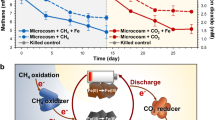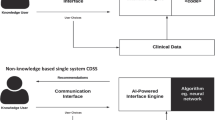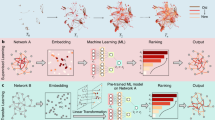Abstract
MANY physiologists hold that sodium bicarbonate is the main form in which carbon dioxide is carried in the blood, and that the elimination of the latter in the lungs is due to the reaction followed by Reaction (i) is very fast, but reaction (ii) is known to be slow. Calculations by Henriques1 and others show indeed that (ii) is too slow to explain the observed rate of CO2 escape in the expired air. Either then there must be a catalyst for reaction (ii) in the blood, or else some quite different chemical mechanism must operate.
This is a preview of subscription content, access via your institution
Access options
Subscribe to this journal
Receive 51 print issues and online access
$199.00 per year
only $3.90 per issue
Buy this article
- Purchase on Springer Link
- Instant access to full article PDF
Prices may be subject to local taxes which are calculated during checkout
Similar content being viewed by others
References
Henriques, Biochem. Z., 200, 1; 1928.
Hawkins and Van Slyke, J. Biol. Chem., 87, 265; 1930.
Brinkman and Margaria, J. Physiol., 72, 6P; 1931.
Meldrum and Roughton, J. Physiol., 75, 3P; 1932.
Author information
Authors and Affiliations
Rights and permissions
About this article
Cite this article
MELDRUM, N., ROUGHTON, F. Carbonic Anhydrase and the State of Carbon Dioxide in Blood. Nature 131, 874–875 (1933). https://doi.org/10.1038/131874b0
Issue Date:
DOI: https://doi.org/10.1038/131874b0
This article is cited by
-
Carbonic anhydrase IV in lizard chemical signals
Scientific Reports (2023)
Comments
By submitting a comment you agree to abide by our Terms and Community Guidelines. If you find something abusive or that does not comply with our terms or guidelines please flag it as inappropriate.



